January 18, 2018
Edited by David Sanders
Specimen Days
1835—Jan van Droogenbroeck, Flemish poet, is born.
1840—Austin Dobson, England, poet/critic/biographer, is born.
1867—Rubén Darío, Nicaraguan Journalist, Diplomat, Poet (d. 1916), is born.
1896—Hans H Holm, Norwegian poet (Jonsoknatt), is born.
1935—Jon Stallworthy, English poet, is born.
1940—Kazimierz P Tetmajer, Polish writer/poet (Young Poland), dies at 74.
2006—Jan Twardowski, Polish poet (b. 1915), dies.
2009—Grigore Vieru, Romanian poet (b. 1935), dies.

martyrs are counting up blows to their faces
the pumpkin of sin has at last fallen on the heads of sticklers
organists are licking sounds –
believers have split into warring camps
And only in the plain open land
in the breath of a herb –
on your knees admiring the sky-drifts
can you still find Silence
—from “Untitled” by Jan Twardowski
[translated by Sarah Lawson and Malgorzata Koraszewska]
“martyrs are counting up blows to their faces / the pumpkin of sin has at last fallen” – Jan Twardowski
World Poetry
Tamil Poet Vairamuthu’s Speech on Seventh-century Mystic Andal Sparks Controversy
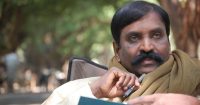
On Wednesday evening, a small group of policemen stood outside the Chennai head office of Dinamani, a widely circulated Tamil newspaper. The publication is battling criticism from the Bharatiya Janata Party and Hindutva groups in Tamil Nadu after it published a speech last week by acclaimed Tamil poet Vairamuthu on the seventh century mystic poet, Andal. Vairamuthu had delivered the speech last week during a discussion on Andal at the Srivilliputhur Andal Temple. In the course of his speech, Vairamuthu cited the research of an American scholar who said that Andal belonged to the Devadasi community and had lived and died at the Srirangam temple in Tiruchirappalli.
Punjabi Poet Surjit Gag Booked for Hurting Religious Sentiments

A complaint was received by senior superintendent of police, Rupnagar, from assistant inspector general of police (Intelligence) with a copy of an essay on Dussehra reportedly written by Gag in which derogatory language has been used for Hindu gods.
Afghanistan's Female Poets Secretly Share Forbidden Words
Mursal, 22, reads her poetry. It's a patriotic verse, dedicated to young people who have made sacrifices in war for Afghanistan. But even with that subject, she is taking a risk: As a woman in Afghanistan, writing is dangerous. "I never share my poetry with my family because they disapprove," says Mursal, clutching her notebook as if she's holding something stolen and dangerous, her eyes furtive and fearful.
Tamil Poet Vairamuthu’s speech on seventh-century mystic Andal sparked controversy recently.
Recent Reviews
What Life in Confinement Meant for Ezra Pound’s Work
by Karl Kirchwey
Perhaps no other poet in the 20th century presents more forcefully than does Ezra Pound the need to separate the life from the work — and the impossibility of doing so. Pound’s visionary role in leading poetry in English into the modern, after the etiolations of the late 19th century, seems incontestable. So do his generosity and loyalty as a critic and friend (to Eliot, Joyce and others), his tirelessness as a teacher, his unorthodox brilliance as a translator from multiple languages and above all, his supreme ambition for poetry, expressed in his long poem the “Cantos,” and in its animating conviction that poetry not only could but should guide the practical motions of society itself.
A Look at Cavafy, Aeschylus and the Poetry of Josephine Balmer
Letting Go and The Paths of Survival belong together: beautiful, modest in language and device, yet far from modest in their concentration and achievement.
by George Szirtes
Most books of poetry are collections written over a specific period, brought together under a title; few are conceived with a single theme, in effect as a single work. That is not the case with Josephine Balmer’s latest publications: two complex, unified constructions, both concerned with loss and preservation – one of a person, the other of a major text. They are two halves of one piece.
‘A Crown of Violets’ by Renée Vivien, translated by Samantha Pious
by Julie R. Enszer
Renée Vivien’s famous poem “Amazon,” or “Amazone” in French, plays on the powerful warrior image of Amazons, opening with the line “The Amazon smiles above the ruins, while / The sun, weary of warfare, sinks to rest.” This Amazon “loves only lovers who offer her their mad / Wild agony and their fierce, proud fall[.]” She scorns “honeyed, watery caresses” and does not like “lukewarm lips.” To contemporary readers, these lines may conjure Wonder Woman, recently embodied by Gal Gadot. For lesbian readers, “Amazon” contributes to the mythology of a time when powerful warrior women thrived. The sun may be weary of war, but the Amazon smiles, ready for more. If the Amazon is a vital part of lesbian mythology, Renée Vivien, the early twentieth century writer and poet, is a vital part of the lesbian literary tradition, discovered and reinvented generationally by bookish lesbians reading to imagine their lives.
Off Radar: ‘The Unfastening’
Dana Wilde takes a look at Wesley McNair's latest collection of poems
by Dana Wilde
If Edgar Allan Poe was right, then Wesley McNair’s most recent collection of poems, “The Unfastening,” is a very beautiful book indeed. Poe said in one of his influential essays about poetry that the tone of the highest manifestation of beauty is sadness. In other words, inherent in your most intimate experiences of beauty is a feeling of sadness. Or to say it the other way around, sadness has a beauty too, and profoundly. And make no mistake, the central intelligence of “The Unfastening” is sadness.
Perhaps no other poet presents more forcefully than does Ezra Pound the need to separate the life from the work — and the impossibility of doing so.
Broadsides
The Poet of Light
by Christian Wiman
Many years ago, before the money bomb dropped on San Francisco and made the city uninhabitable, I lived in a basement apartment in the Upper Haight. Aside from the low price, and the big floor-to-ceiling pipe that every so often came alive with waste from above like an ironic rain stick, I think what chiefly appealed to me about the place was the gloom. If you’re going to become a writer in a city that glitters like that one, I thought, you need a little cave of pain.
Means of Escape: César Vallejo’s “Scales”
by David S. Wallace
Vallejo had seemed on course for success. The 12th child of a mixed-race family from a small town in the Andean highlands, his talent had drawn him from the periphery toward Peru’s cultural center. He had “arrived” as a young member of the intelligentsia, a teacher and author of a slim volume of well-received verse. But on a trip to his hometown of Santiago de Chuco, Peru, he became involved in a political demonstration that turned into a riot.
'Bra Willie' Eulogy: We will Miss his Epic Poetry, Baobab-wit and Sage
Advice to Leaders
by Parks Tau

It could never be said that Prof Keorapetse “Bra Willie” Kgositsile was an ivory tower intellectual. To him, being designated as a public intellectual meant that his poetry was informed by politics; and politics was eventually influenced by his poetry.
To Keorapetse “Bra Willie” Kgositsile, being designated as a public intellectual meant his poetry was informed by politics; and politics was eventually influenced by his poetry.
Drafts & Fragments
Why My Father Cecil Day-Lewis’s Poem "Walking Away" Stands the Test of Time
by Sean Day-Lewis
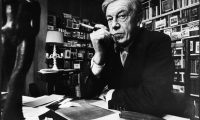
It was good to see the last couplet of my father’s Walking Away properly quoted by Saskia Sarginson (Empty nest? Not a chance, Family, 6 January). But she is a little off-message with her view that this Cecil Day-Lewis poem was “written for a different society”.
From Baryshnikov, Poetry in Motion
by Patti Hartigan
The late Russian poet Joseph Brodsky and dancer Mikhail Baryshnikov were long-time friends, even though the Nobel Prize-winning poet was not a fan of classical ballet. Brodsky also didn’t have much use for theater. According to Baryshnikov, his friend once visited the Royal Shakespeare Company in London. “He told them that Shakespeare wrote his plays for just reading and not for staging. He said, ‘It’s so much better to lie down on your couch, have a little whiskey, and read “Hamlet” and imagine the characters,’” Baryshnikov says.
Capital Region Refugees Translate Strange Times into Poetry
by Lynda J. Edwards

University at Albany student Iglal Abdelrahman, newly arrived from the Sudan, experienced her first snow recently. She donned a hijab the color of bright roses, then grabbed her tiny spiral notebook where she jotted down how snowflakes tumbled from the gray sky. She made a note of her shoes crunching ice-glazed grass, a sound as if bird bones were shattering. In her poetry classes at the Refugee and Immigrant Support Services of Emmaus building, she and other immigrants as well as war refugees from all over the globe keep their observations in small notebooks. Their teacher, Chatham poet Mark Nowak, tells them to carry the notebooks everywhere. Students who grew up speaking Arabic, Russian, Ukrainian, Farsi or Mandarin transform their notes into poetry — in English.
University at Albany student Iglal Abdelrahman, newly arrived from the Sudan, experienced her first snow recently.
Poetry In the News
How the Astro Poets Lit Up the Internet
The universe is a swirling cosmic cocktail of galaxies made up of specks of dust, and Alex Dimitrov and Dorothea Lasky are alive and writing poetry in it. The two poets, who are also best friends and creative collaborators, are always thinking about the stars. The first thing the pair ever talked about, when they met in a Brooklyn loft in 2010, while drinking cheap champagne at an after-party for a poetry reading, was the movement of the constellations. “Alex walked up to me and told me he was a Sagittarius,” said Ms. Lasky, 39. “And I knew, it was going to work. When a Sagittarius spots an Aries across a room, there’s an immediate connection.”
US Poet Laureate Starts Rural Reading Tour in New Mexico
The U.S. poet laureate has embarked on a series of trips to bring her poetry to rural pockets of the country, with stops in Native American communities and other places she says her work hasn't taken her in the past. In an interview, Pulitzer Prize-winner Tracy K. Smith said Friday that she has grown curious about how conversations about poetry have evolved in wide swaths of the United States beyond the reach of book festivals. She is launching the tour — which began this week in New Mexico and will take her to the rural South in the coming months — because she also wants to show how poetry can help people see the world from other perspectives.
Hilary Mantel and Alan Moore Voice 'Grave concerns' for John Clare Archive
Hilary Mantel, Alan Moore and Simon Armitage have joined authors raising “grave concerns” about the custodianship of the poet John Clare’s manuscripts in advance of major planned cuts to the library service in Northamptonshire.
The universe is a swirling cosmic cocktail of galaxies made up of specks of dust, and Alex Dimitrov and Dorothea Lasky–The Astropoets–are alive and writing poetry.
New Books
Contemplacion Contemplation by Yanira Marimon
[Paperback] Red Mountain Press, 58 pp., $18.95
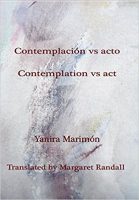
In this book, as in others, Marimón creates unforgettable images in a voice uniquely her own. But her poems are more than images. They convey a sort of triumphal loneliness characteristic of her generation, a deep reverence for the symbols of her national landscape and culture laced with the personal dreams she is unafraid to express: "She only wanted to escape to a different place / feel the nostalgia of exile, be truly sad / apart, / a weightless autumn leaf," she says in "One day in 1980.” Translated from the Spanish by Margaret Randall.
Complete Poems by Salvatore Quasimodo
[Paperback] Carcanet Press, 248 pp., $25.95
Jack Bevan’s remarkable translation of Quasimodo’s entire poetic oeuvre (Anvil, 1983), redesigned and reissued in 2017. Salvatore Quasimodo (1901–1968) was awarded the Nobel Prize in 1959 for ‘his lyrical poetry which with classical fire expresses the tragic experience of life in our time’. Jack Bevan’s remarkable translation of Quasimodo’s entire poetic oeuvre fills a great gap in our knowledge of twentieth-century European poetry.
3: Falling Ill: Last Poems by C. K. Williams
[Paperback] Farrar, Straus and Giroux, 64 pp., $13.00
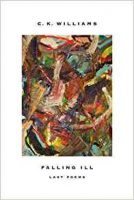
Over the past half century, the great shape-shifting poet C. K. Williams took upon himself the poet’s task: to record with candor and ardor “the burden of being alive.” In Falling Ill, his final volume of poems, he brings this task to its conclusion, bearing witness to a restless mind’s encounter with the brute fact of the body’s decay, the spirit’s erasure.
Synæsthesium: Poems by Moira Egan
[Hardcover] Criterion Books, 120 pp., $22.00
Synæsthesium is an unusual exploration of ekphrasis―poetry that takes a real or imagined work of art as its muse. The first half of the book, Olfactorium, is inspired by various fragrances and the olfactory flashbacks―real or imagined―induced by them. From everyday Old Spice to exotic Casbah, the poems take the reader on journeys peppered with the luscious language of perfumery. The second part, Love and Work, is based on the works of Suzanne Valadon, the bold and unconventional model-turned-artist, peer and probable lover of Renoir, Toulouse-Lautrec, and other painters. The poetic forms―sonnets, syllabics, a villanelle, a rondeau―reflect the content of the paintings and drawings of this great and under-appreciated artist.
Bakkhai by Euripides
[Hardcover] New Directions, 96 pp., $14.95
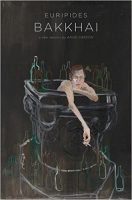
Anne Carson writes, “Euripides was a playwright of the fifth century BC who reinvented Greek tragedy, setting it on a path that leads straight to reality TV. His plays broke all the rules, upended convention and outraged conservative critics. The Bakkhai is his most subversive play, telling the story of a man who cannot admit he would rather live in the skin of a woman, and a god who seems to combine all sexualities into a single ruinous demand for adoration. Dionysos is the god of intoxication. Once you fall under his influence, there is no telling where you will end up.”
Euripides reinvented Greek tragedy, setting it on a path that leads straight to reality TV. His plays broke rules, upended convention and outraged conservative critics.
Correspondences
Minds of the Immortals: Emily Wilson on Translating "The Odyssey"
by Ben Shields
“The minds of the immortals rarely change,” old King Nestor tells Telemachus in Book III of The Odyssey. That may be true, but the ways that we experience and imagine those gods change regularly. Since the sixteenth century, dozens of English-language translators have traversed the epics of archaic Hellas, and all of them have returned with their own unique account: Blank verse, couplets, and prose are all available portals into Homer. But few have internalized the old cliche, “Translation is interpretation.” Professor Emily Wilson, the Odyssey’s newest intermediary bard, is doing more to correct that than any translator of Homer in history.
Instead of Dying: Poetry Collection Explores Mourning Process
by Emily Woodbury and Charity Nebbe

Lauren Haldeman is a poet and illustrator who lives in Iowa City. She’s a Writer’s Workshop graduate and the winner of the Colorado Prize for Poetry. On this Talk of Iowa segment, she talks about how her latest poetry collection, Instead of Dying, was inspired in part by the death of her younger brother, Ryan. “What I learned in the deep grief of losing him was that, even though days would be terrible, long, headache-filled, nausea-filled painful days in a haze, there would still be bits of joy and there’d still be things that were silly and strange and wild and wonderful inside those days,” she says, “and that in order to notice those, I had to fully be with the other stuff too.”
Natasha Trethewey: Say It, Say It Again
The poet’s haunting ‘Native Guard,’ now a theatre piece at the Alliance, goes to the Civil War and back.
by Rob Weinert-Kendt

Poet Natasha Trethewey’s Pulitzer-winning 2007 collection Native Guard, which partly memorialized an African-American Civil War soldier protecting a Union-captured fort on Ship Island, Miss., was first turned into a stage work in 2014 at the Alliance Theatre. It returns Jan. 13-Feb. 4. Trethewey was U.S. poet laureate from 2012 to 2014.
Lauren Haldeman is a poet and illustrator who lives in Iowa City. She’s a Writer’s Workshop graduate and the winner of the Colorado Prize for Poetry.
Envoi: Editor’s Notes
From the Archives
This morning I was reading a tweet from a friend, which consisted of an article from LitHub titled "Where is Wisława Szymborska's Teeming Crowd?" It was literally refreshing: when I saw the originally date of publication–January 8, 2016— it occurred to me that I had posted it on this site two years ago, almost to the day.
In case you missed it the first time or haven't come across it on your own or simply want to be refreshed, here it is again. It's worth a second reading.
WHERE IS WISŁAWA SZYMBORSKA’S TEEMING CROWD?
REMEMBERING THE GREAT POET 20 YEARS AFTER HER NOBEL PRIZE
by Jonathan Russell Clark
With customary wit, the Polish poet and Nobel Prize-winner Wisława Szymborska, in 1962, wryly uses an imagined tombstone to communicate—prophetically, it turns out—with the people of the future:
Epitaph
Here lies, old-fashioned as parentheses.
the authoress of verse. Eternal rest
was granted her by earth, although the corpse
had failed to join the avant-garde, of course.
The plain grave? There’s poetic justice in it,
this ditty-dirge, the owl, the burdock. Passerby,
take out your compact Compu-Brain and try
to weigh Szymborska’s fate for half a minute.
So, let us dignify the late poet by pausing on our smart phones (where you may be reading this), if only for the length of an autoplay commercial, to grant her request.
You can read the rest of it here. Enjoy.
“Passerby, / take out your compact Compu-Brain and try / to weigh Szymborska’s fate for half a minute.” – Jonathan Russell Clark